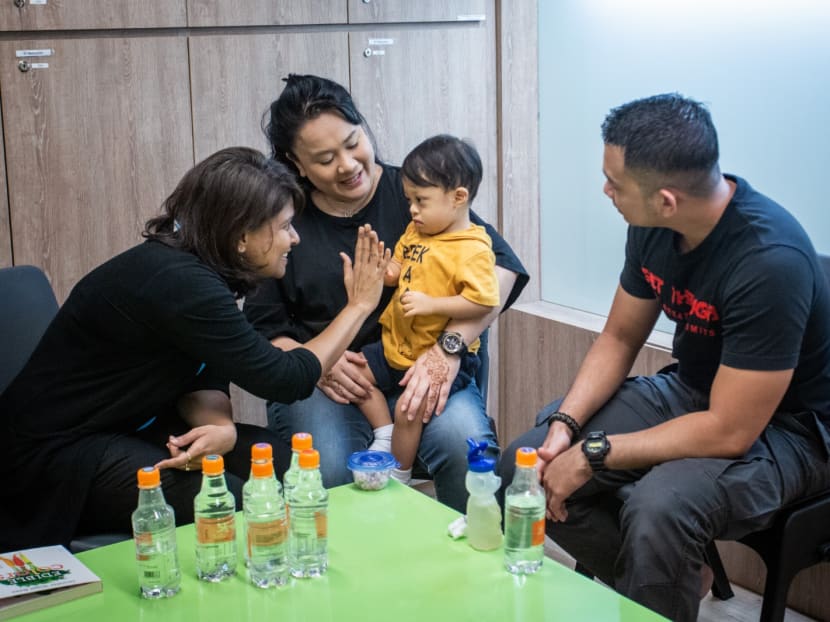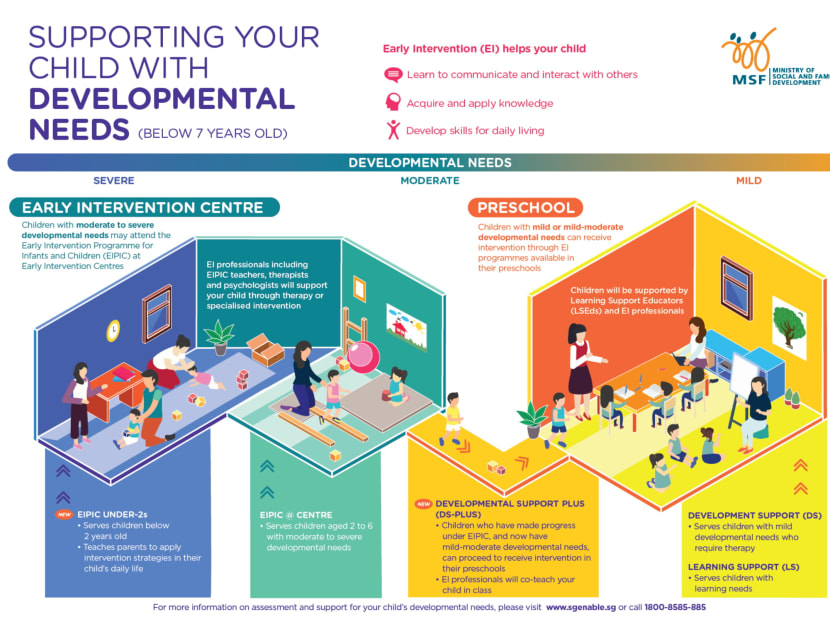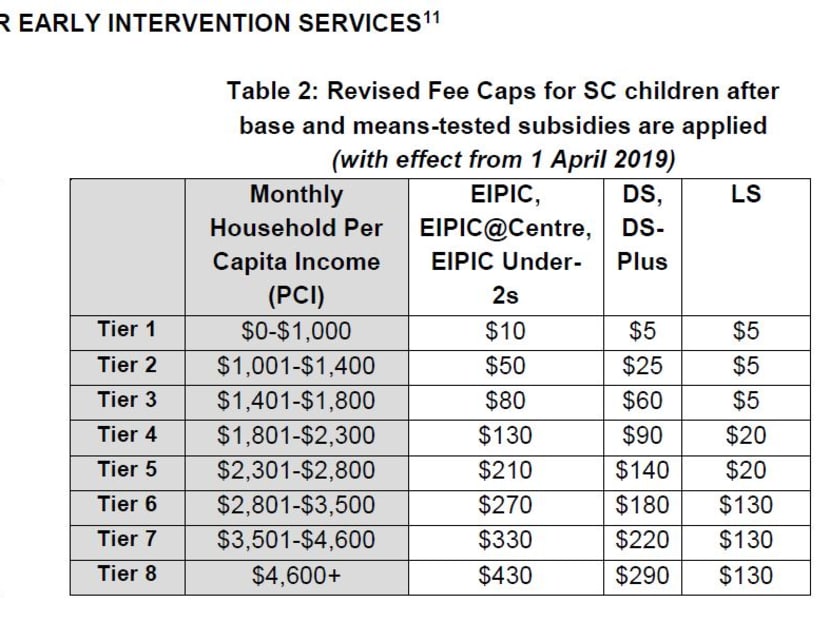More affordable, targeted early intervention programmes for children with developmental needs
SINGAPORE — Caregivers of children with developmental needs aged two and below will soon be able to benefit from a more targeted support and educational programme from July this year.

Under the new Early Intervention Programme for Infants and Children (EIPIC) Under-2s, all children with moderate to severe developmental delays enrolled under EIPIC will receive more targeted intervention. Unlike the existing EIPIC programme, the EIPIC Under-2s requires children to be accompanied by their parents and caregivers during all sessions.
SINGAPORE — Caregivers of children with developmental needs aged two and below will soon be able to benefit from a more targeted support and training programme from July this year.
Dubbed the Early Intervention Programme for Infants and Children (EIPIC) Under-2s, it will cater to children with moderate to severe developmental needs, such as autism spectrum disorder, global development delay and muscular dystrophy.
Currently, all children aged six and below are put into a standard programme, where they receive the same model of EIPIC intervention across different ages and needs.
Under the the EIPIC Under-2s programme, caregivers and parents will be taught intervention strategies — how to feed and dress their child, and communicate using flashcards or visual cues, among other skills — to help them reach developmental milestones.
Besides being better tailored to suit the needs of children aged two and below, the programme will also require the compulsory involvement of caregivers, unlike before.

Another programme, called the Developmental Support Plus (DS Plus), which cater to children who have made sufficient progress under the EIPIC, will also be rolled out from July.
The benefit of this programme is that these children will be able to receive intervention while attending mainstream preschools and be equipped with skills in a larger class setting.
Unveiling the new programmes on Monday (Jan 28), the Ministry of Social and Family Development (MSF) also said that fees across all early intervention programmes for most income groups will be reduced by some 30 to 70 per cent on average from April 2019.
To that end, the ministry will invest S$60 million a year, a 30 per cent increase from S$45 million currently, to provide the two new programmes and to make fees more affordable.
Approximately 3 per cent of the birth cohorts below seven are referred to EIPIC, said the MSF. The ministry expects some 4,500 children and families to benefit from the enhanced programmes each year.
The launch of EIPIC Under-2s and DS Plus follows a two-year pilot to develop the programmes, involving approximately 700 children from three centres providing early intervention services: Thye Hua Kwan at Ang Mo Kio, AWWA at Hougang and SPD (formerly the Society for the Physically Disabled) at Jurong East.
The two programmes will be rolled out across the sector in phases. Thirteen of the 21 centres providing early intervention services will introduce the programme from July this year. This includes AWWA Fernvale, SPD Tiong Bahru, Thye Hua Kwan Choa Chu Kang and the Rainbow Centre at Margaret Drive and Yishun.
From the fourth quarter this year, the Cerebral Palsy Alliance Singapore will also offer these two programmes.
EIPIC Under-2s: Early Intervention Programme for Infants and Children (EIPIC) for children 2 and below
CURRENT EIPIC@Centre Programme:
Children from age 0 to 6 are put into a one-size-fits-all programme
Children receive same model of EIPIC intervention across different ages and needs
Non-compulsory for parents and caregivers to attend sessions with children
EIPIC sessions two to three times a week, totalling five to 12 hours
Sessions run by EIPIC teachers, therapists and psychologists, including home visits
EIPIC UNDER-2s:
Under EIPIC Under-2s, children from age 0 to 2 will receive targeted intervention, with increased emphasis on skilling of caregivers
Compulsory for parents and caregivers to attend sessions
EIPIC Under-2s sessions are run one to two times a week, each spanning two to four hours
Include home visits by EIPIC teachers, therapists and psychologists, who teach caregivers how to care for children with developmental needs in familiar settings at home
At age 2, children will transit into the EIPIC@Centre programme
DS Plus: Developmental Support Plus
CURRENT DEVELOPMENTAL SUPPORT:
Under the developmental support programme, children with mild developmental needs will undergo therapy sessions
Sessions are once a week, each lasting one to two hours
Whole programme lasts three to four months
DEVELOPMENTAL SUPPORT PLUS:
Serves children with mild-moderate developmental needs, who have made sufficient progress under the EIPIC programme
Two sessions a week, each lasting two to four hours
Whole programme to last three to six months
MORE AFFORDABLE CARE
Fees for all early intervention programmes will also be lowered for most income groups from April 1.
After subsidies, fees for Singapore Citizens will range from S$5 to S$430 a month, down from a range of S$5 to S$780 before.

For example, the cost for a child from a four-member family with a combined household income of S$4,000 (or a per capita income of S$1,000) under EIPIC will be reduced from S$120 to S$10 a month. For the Developmental Support programme, the cost will be reduced from S$60 to S$5.
MSF said that it will continue to work with early intervention service providers to extend additional financial support to families who may require more help, such as those with more than one child with developmental needs or those who require long-term care.
WHY IT MATTERS:
Research has shown that timely and quality early intervention services can have an impact on a child’s developmental trajectory and improve educational and social outcomes for children and their families.
Among others, one study done by American researchers in the University of Washington, and published online in the journal Pediatrics, found that early intervention programmes which combine teaching methods and relationship-building approaches for very young children with autism — some as young as 18 months — are effective for improving intelligence, language ability and social interaction.
In addition, early intervention programme service providers like AWWA cited cost as one of the challenges faced by parents when deciding on whether to send their child for early intervention programmes.
With positive results shown from the pilot EIPIC Under-2s programme, it could serve to encourage more parents who may not be comfortable accepting that their child may require early intervention services.
“For the younger group of children below three years old, definitely there are parents who are not ready to accept that their children have been referred to an early intervention programme, so we really need to help them understand… to accept and work with them and their children,” said Ms Tan Peng Chian, deputy director for children and disability at AWWA.









